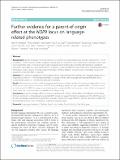Files in this item
Further evidence for a parent-of-origin effect at the NOP9 locus on language-related phenotypes
Item metadata
| dc.contributor.author | Pettigrew, Kerry Andrea | |
| dc.contributor.author | Frinton, Emily | |
| dc.contributor.author | Nudel, Ron | |
| dc.contributor.author | Chan, May T. M. | |
| dc.contributor.author | Thompson, Paul | |
| dc.contributor.author | Hayiou-Thomas, Marianna E. | |
| dc.contributor.author | Talcott, Joel B. | |
| dc.contributor.author | Stein, John | |
| dc.contributor.author | Monaco, Anthony P. | |
| dc.contributor.author | Hulme, Charles | |
| dc.contributor.author | Snowling, Margaret J. | |
| dc.contributor.author | Newbury, Diane F. | |
| dc.contributor.author | Paracchini, Silvia | |
| dc.date.accessioned | 2016-06-15T14:30:06Z | |
| dc.date.available | 2016-06-15T14:30:06Z | |
| dc.date.issued | 2016-06-14 | |
| dc.identifier | 243223214 | |
| dc.identifier | 7f8a8459-d6f0-4b3d-bd1b-7fb6c27486df | |
| dc.identifier | 84975166180 | |
| dc.identifier | 000377788200001 | |
| dc.identifier.citation | Pettigrew , K A , Frinton , E , Nudel , R , Chan , M T M , Thompson , P , Hayiou-Thomas , M E , Talcott , J B , Stein , J , Monaco , A P , Hulme , C , Snowling , M J , Newbury , D F & Paracchini , S 2016 , ' Further evidence for a parent-of-origin effect at the NOP9 locus on language-related phenotypes ' , Journal of Neurodevelopmental Disorders , vol. 8 , 24 . https://doi.org/10.1186/s11689-016-9157-6 | en |
| dc.identifier.issn | 1866-1947 | |
| dc.identifier.other | ORCID: /0000-0001-9934-8602/work/60428104 | |
| dc.identifier.uri | https://hdl.handle.net/10023/8991 | |
| dc.description | SP is a Royal Society University Research Fellow. Support to the analysis was provided by the St Andrews Bioinformatics Unit funded by the Wellcome Trust [grant 097831/Z/11/Z]. Analysis of the cohort was supported by a Wellcome Trust Programme Grant to MJS [WT082032MA]. EF is the recipient of a Wolfson Intercalated Award. MTMC is the recipient of the Wilkinson Junior Research Fellowship at Worcester College, Oxford and was funded by the Esther Yewpick Lee Millennium Scholarship. RN was funded by a University of Oxford Nuffield Department of Medicine Prize Studentship. DFN is an MRC Career Development Fellow. The work of the Newbury lab is funded by the Medical Research Council [G1000569/1 and MR/J003719/1]. The work of the Wellcome Trust Centre in Oxford is supported by the Wellcome Trust [090532/Z/09/Z]. | en |
| dc.description.abstract | Background: Specific Language Impairment (SLI) is a common neurodevelopmental disorder, observed in 5-10% of children. Family and twin studies suggest a strong genetic component, but relatively few candidate genes have been reported to date. A recent genome-wide association study (GWAS) described the first statistically significant association specifically for a SLI cohort between a missense variant (rs4280164) in the NOP9 gene and language-related phenotypes under a parent-of-origin model. Replications of these findings are particularly challenging because the availability of parental DNA is required. Methods: We used two independent family-based cohorts characterised with reading- and language-related traits: a longitudinal cohort (n = 106 informative families) including children with language and reading difficulties and a nuclear family cohort (n = 264 families) selected for dyslexia. Results: We observed association with languagerelated measures when modelling for parent-of-origin effects at the NOP9 locus in both cohorts: minimum P = 0.001 for phonological awareness with a paternal effect in the first cohort and minimum P = 0.0004 for irregular word reading with a maternal effect in the second cohort. Allelic and parental trends were not consistent when compared to the original study. Conclusions: A parent-of-origin effect at this locus was detected in both cohorts, albeit with different trends. These findings contribute in interpreting the original GWAS report and support further investigations of the NOP9 locus and its role in language-related traits. A systematic evaluation of parent-of-origin effects in genetic association studies has the potential to reveal novel mechanisms underlying complex traits. | |
| dc.format.extent | 8 | |
| dc.format.extent | 493196 | |
| dc.language.iso | eng | |
| dc.relation.ispartof | Journal of Neurodevelopmental Disorders | en |
| dc.subject | Language impairement | en |
| dc.subject | Dyslexia | en |
| dc.subject | Genetic association | en |
| dc.subject | Parent-of-origin | en |
| dc.subject | Candidate gene | en |
| dc.subject | RC0321 Neuroscience. Biological psychiatry. Neuropsychiatry | en |
| dc.subject | NDAS | en |
| dc.subject.lcc | RC0321 | en |
| dc.title | Further evidence for a parent-of-origin effect at the NOP9 locus on language-related phenotypes | en |
| dc.type | Journal article | en |
| dc.contributor.sponsor | The Wellcome Trust | en |
| dc.contributor.institution | University of St Andrews. School of Medicine | en |
| dc.contributor.institution | University of St Andrews. Biomedical Sciences Research Complex | en |
| dc.identifier.doi | 10.1186/s11689-016-9157-6 | |
| dc.description.status | Peer reviewed | en |
| dc.identifier.grantnumber | 097831/z/11/z | en |
This item appears in the following Collection(s)
Items in the St Andrews Research Repository are protected by copyright, with all rights reserved, unless otherwise indicated.

